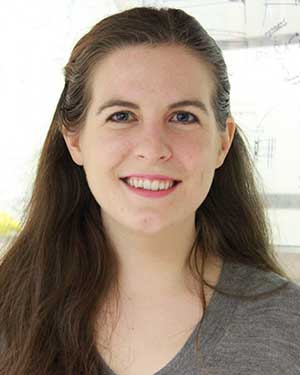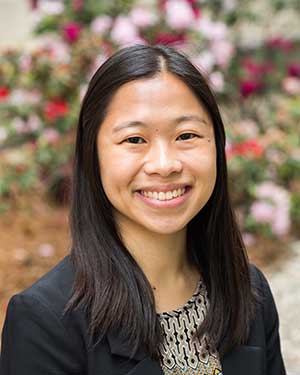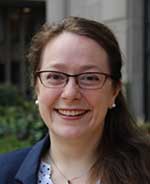APS Congressional Science Fellows Use Expertise to Impact Policy on Capitol Hill
By Tawanda W. Johnson
After a year of working on Capitol Hill, the 2018-19 APS Congressional Science Fellows Jennifer Dailey and Abigail Regitsky said they developed an appreciation for the role scientists play in federal decision making and are committed to building on their knowledge of science policy.
“I had been so entrenched in my life in the lab that I didn’t even know how science and policy interact. This fellowship was the perfect opportunity to experience how science and scientists are viewed by decision-makers,” said Jennifer Dailey, who worked in US Senator Ben Cardin’s office. Cardin represents the state of Maryland.
Sponsored by APS under the umbrella of the American Association for the Advancement of Science (AAAS) Science & Technology Fellowships, the Congressional Science Fellowships aim to provide a public service by making available individuals with scientific knowledge and skills to members of Congress, few of whom have technical backgrounds. In turn, the program enables scientists to broaden their experience through direct involvement with the policy-making process.
Fellowships are for one year, typically running September through August. Following a two-week orientation in Washington, DC, sponsored by AAAS, incoming fellows become acquainted with their new work environment. After interviews on Capitol Hill, fellows choose a congressional office where they would like to serve.

Jennifer Dailey

Abigail Regitsky
Just like Dailey, Regitsky was eager to become a Congressional Science Fellow.
“Throughout my educational and career path, I was always motivated by wanting to make the world a more sustainable place. I pursued a PhD because I thought I would work in industry on R&D of sustainable materials. However, as I progressed through graduate school, I found myself becoming more interested in making a broad impact through policy rather than focusing on one particular technological solution,” she said.
Regitsky added, “The Congressional Fellowship was the perfect way for me to leverage my technical experience to inform policy decisions and to make a career transition from research to policy.”
Both fellows recalled key accomplishments throughout their time on Capitol Hill, including connecting with other scientists and using their scientific expertise to address crucial policy issues.
Dailey said one of her main accomplishments was “the extended network of fellow scientists and researchers” that she was able to cultivate as a fellow.
“Nothing in science or policy happens in a vacuum, and through this fellowship, I was introduced to so many incredible people from every discipline and every career stage,” she said.
Dailey added, “I also used my skills as a science translator to explain what the recent climate report was telling us about impacts in Maryland. Even after a year of study, I think I still only vaguely grasp the intricacies surrounding drug pricing in this country, but I still felt incredibly accomplished when I was able to use my research and analytic skills to explain flow charts and cause-and-effect chains to help inform discussion on drug pricing legislation.”
For Regitsky, who served in US Sen. Tina Smith’s office representing Minnesota, a big achievement was helping to develop and launch the Clean Energy Standard Act of 2019. Introduced in May 2019 by Smith and US Rep. Ben Ray Luján, the bill would put the US electric sector on a path toward 100 percent decarbonization.
“I was deeply involved in all aspects of the bill, including engaging with over 50 stakeholder groups; writing summary documents; acquiring cosponsors; and strategizing the bill’s rollout,” she recalled.
Regitsky added, “During my fellowship, I also helped organize a AAAS Fellows symposium on deep decarbonization as a member of the Energy/Climate Affinity Group. I organized and moderated the panel session on industrial decarbonization, focusing on technologies and policies needed for reducing emissions from the industrial sector.”
The positive impact both Dailey and Regitsky made during their fellowships will likely go a long way in making a difference in science policy, according to people who worked with them.
“Jen is one of those people who has an innate thirst for knowledge. During her time with our office, she was eager to dive in to unfamiliar topics and explore and develop policy solutions to address drug shortages, women's health, and the Chesapeake Bay restoration with intensity and gusto. She has also brought an incredible wealth of knowledge to our office and found ways to translate science into what we are doing legislatively,” said Lauren Jee, who handles the health portfolio for Sen. Cardin and supervised Dailey during her fellowship.
Pete Wyckoff, the energy and environment policy advisor for Sen. Smith and Regitsky’s supervisor, said, “Abigail was an amazing addition to the Smith Office and greatly expanded the capacity of Senator Smith’s Energy and Environment Team. Abigail was particularly instrumental in helping to develop two of the clean energy bills that Senator Smith introduced this year.”
He added, “In a very short time, Abigail became well known in the clean energy community in DC, and I am sure that the connections she made while she worked in our office helped her land the job she now has as a committee staff member in the House of Representatives.”
Regitsky’s position will enable her to continue to make an impact on climate change.
“I am now a professional staff member of the House Select Committee on the Climate Crisis. Our committee is charged with developing policy recommendations to the standing committees of Congress on how to decarbonize the economy, as well as address adaptation and resilience to the effects of climate change,” she explained.
As for Dailey, she is working as senior analyst at the National Security Analysis Department at Johns Hopkins University Applied Physics Laboratory.
“It feels like a great fit since I can use my new policy know-how to help inform my analyses. I look forward to staying involved with APS policy and outreach groups,” she said.
Francis Slakey, chief government affairs officer for APS, said he was thrilled to learn about the fellows’ terrific experiences on Capitol Hill.
“We at APS want to make sure that the Congressional Fellows put their technical expertise to excellent use during their fellowships, and it is clear that both Jennifer and Abigail were able to accomplish that goal,” he said.
The author is the APS Senior Press Secretary.
 APS Congressional Science Fellow 2019-2020
APS Congressional Science Fellow 2019-2020
Laura Gladstone, the recipient of the APS Congressional Science Fellowship for the 2019-20 calendar year, has chosen to serve as a Fellow for the Minority Staff on the Senate Committee on Homeland Security and Government Affairs. Information about Gladstone’s experience will be shared in APS News after her fellowship. APS maintains a “hands off” policy with current Congressional Fellows to avoid any conflict of interest.
©1995 - 2024, AMERICAN PHYSICAL SOCIETY
APS encourages the redistribution of the materials included in this newspaper provided that attribution to the source is noted and the materials are not truncated or changed.
Editor: David Voss
Staff Science Writer: Leah Poffenberger
Contributing Correspondent: Alaina G. Levine
Publication Designer and Production: Nancy Bennett-Karasik
November 2019 (Volume 28, Number 10)
Articles in this Issue

